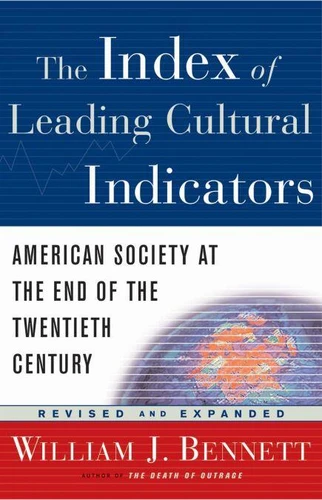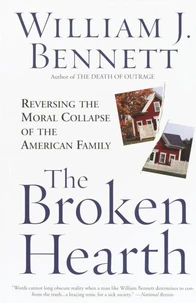The Index of Leading Cultural Indicators. American Society at the End of the Twentieth Century
Par :Formats :
Disponible dans votre compte client Decitre ou Furet du Nord dès validation de votre commande. Le format ePub protégé est :
- Compatible avec une lecture sur My Vivlio (smartphone, tablette, ordinateur)
- Compatible avec une lecture sur liseuses Vivlio
- Pour les liseuses autres que Vivlio, vous devez utiliser le logiciel Adobe Digital Edition. Non compatible avec la lecture sur les liseuses Kindle, Remarkable et Sony
- Non compatible avec un achat hors France métropolitaine
 , qui est-ce ?
, qui est-ce ?Notre partenaire de plateforme de lecture numérique où vous retrouverez l'ensemble de vos ebooks gratuitement
Pour en savoir plus sur nos ebooks, consultez notre aide en ligne ici
- Nombre de pages272
- FormatePub
- ISBN978-0-307-77809-3
- EAN9780307778093
- Date de parution03/08/2011
- Protection num.Adobe DRM
- Taille7 Mo
- Infos supplémentairesepub
- ÉditeurWaterBrook
Résumé
For decades Americans have turned to the Commerce Department's Index of Leading Economic Indicators to spot trends in the economy. The Index of Leading Cultural Indicators brings a similar kind of empirical analysis to the moral, social, and behavioral condition of American society from 1960 to the present--a vivid, clearly accessible portrait in numbers of who and where we are as a nation. First published in 1994 and now completely updated and considerably expanded, it draws from a wide array of government sources and academic studies to offer comprehensive chapters on crime, the family, youth behavior, education, popular culture, and religion, as well as new chapters on civic participation, international comparisons, and decade-by-decade comparisons.
For each topic covered, there are statistical and numerical breakdowns; tables and graphs; ranking of states; and a "Factual Overview" interpreting the data. The Index of Leading Cultural Indicators should serve as the starting point of any discussion about America's moral and cultural condition. William J. Bennett's provocative introduction provides the essential context and perspective for the data he's collected, offering an assessment of the problems besetting modern America.
Some have gotten better--most notably, crime and welfare rates--leading him to conclude that politics and public engagement in social issues can make more of a difference than he once thought. But there is much else of a worrying nature, and Bennett pulls no punches in identifying pathologies and laying out the challenges we face. No one who cares about American society and a whole range of social issues can afford to be without this essential volume--a statistical snapshot, an invaluable sourcebook, and a call to action.
For each topic covered, there are statistical and numerical breakdowns; tables and graphs; ranking of states; and a "Factual Overview" interpreting the data. The Index of Leading Cultural Indicators should serve as the starting point of any discussion about America's moral and cultural condition. William J. Bennett's provocative introduction provides the essential context and perspective for the data he's collected, offering an assessment of the problems besetting modern America.
Some have gotten better--most notably, crime and welfare rates--leading him to conclude that politics and public engagement in social issues can make more of a difference than he once thought. But there is much else of a worrying nature, and Bennett pulls no punches in identifying pathologies and laying out the challenges we face. No one who cares about American society and a whole range of social issues can afford to be without this essential volume--a statistical snapshot, an invaluable sourcebook, and a call to action.
For decades Americans have turned to the Commerce Department's Index of Leading Economic Indicators to spot trends in the economy. The Index of Leading Cultural Indicators brings a similar kind of empirical analysis to the moral, social, and behavioral condition of American society from 1960 to the present--a vivid, clearly accessible portrait in numbers of who and where we are as a nation. First published in 1994 and now completely updated and considerably expanded, it draws from a wide array of government sources and academic studies to offer comprehensive chapters on crime, the family, youth behavior, education, popular culture, and religion, as well as new chapters on civic participation, international comparisons, and decade-by-decade comparisons.
For each topic covered, there are statistical and numerical breakdowns; tables and graphs; ranking of states; and a "Factual Overview" interpreting the data. The Index of Leading Cultural Indicators should serve as the starting point of any discussion about America's moral and cultural condition. William J. Bennett's provocative introduction provides the essential context and perspective for the data he's collected, offering an assessment of the problems besetting modern America.
Some have gotten better--most notably, crime and welfare rates--leading him to conclude that politics and public engagement in social issues can make more of a difference than he once thought. But there is much else of a worrying nature, and Bennett pulls no punches in identifying pathologies and laying out the challenges we face. No one who cares about American society and a whole range of social issues can afford to be without this essential volume--a statistical snapshot, an invaluable sourcebook, and a call to action.
For each topic covered, there are statistical and numerical breakdowns; tables and graphs; ranking of states; and a "Factual Overview" interpreting the data. The Index of Leading Cultural Indicators should serve as the starting point of any discussion about America's moral and cultural condition. William J. Bennett's provocative introduction provides the essential context and perspective for the data he's collected, offering an assessment of the problems besetting modern America.
Some have gotten better--most notably, crime and welfare rates--leading him to conclude that politics and public engagement in social issues can make more of a difference than he once thought. But there is much else of a worrying nature, and Bennett pulls no punches in identifying pathologies and laying out the challenges we face. No one who cares about American society and a whole range of social issues can afford to be without this essential volume--a statistical snapshot, an invaluable sourcebook, and a call to action.





